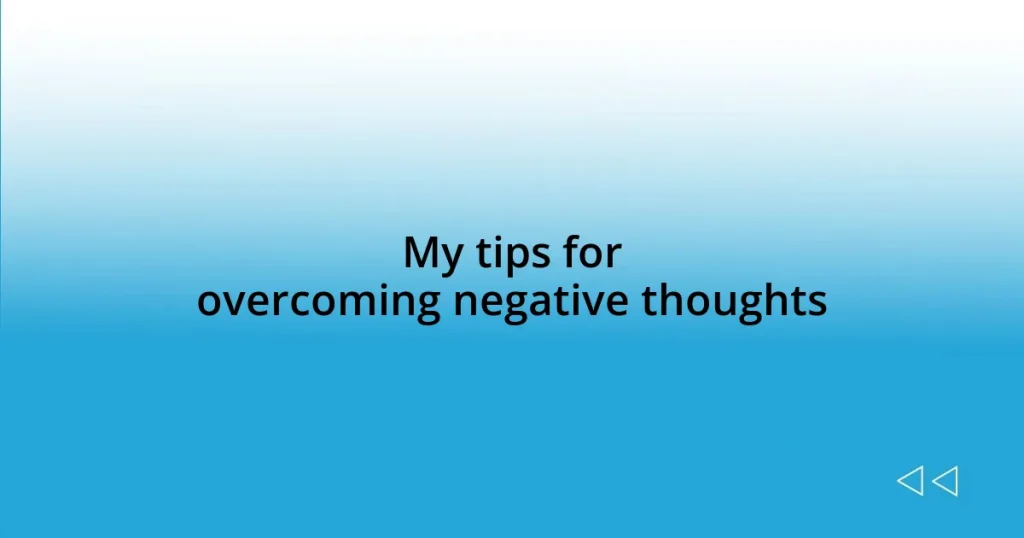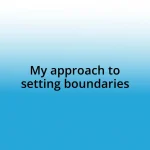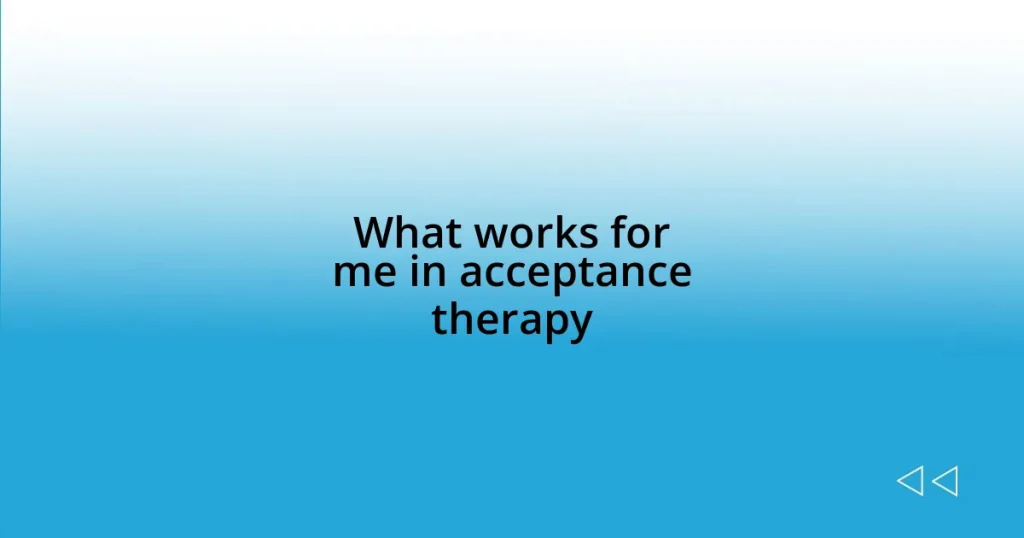Key takeaways:
- Negative thoughts are not reflections of reality but interpretations influenced by emotions and experiences.
- Identifying triggers of negativity, such as environments, people, and media, empowers individuals to manage their mindset.
- Practicing mindfulness and daily positive affirmations can significantly shift perspectives and combat negativity.
- Seeking support from friends, support groups, or professionals can alleviate emotional burdens and foster a sense of connection.
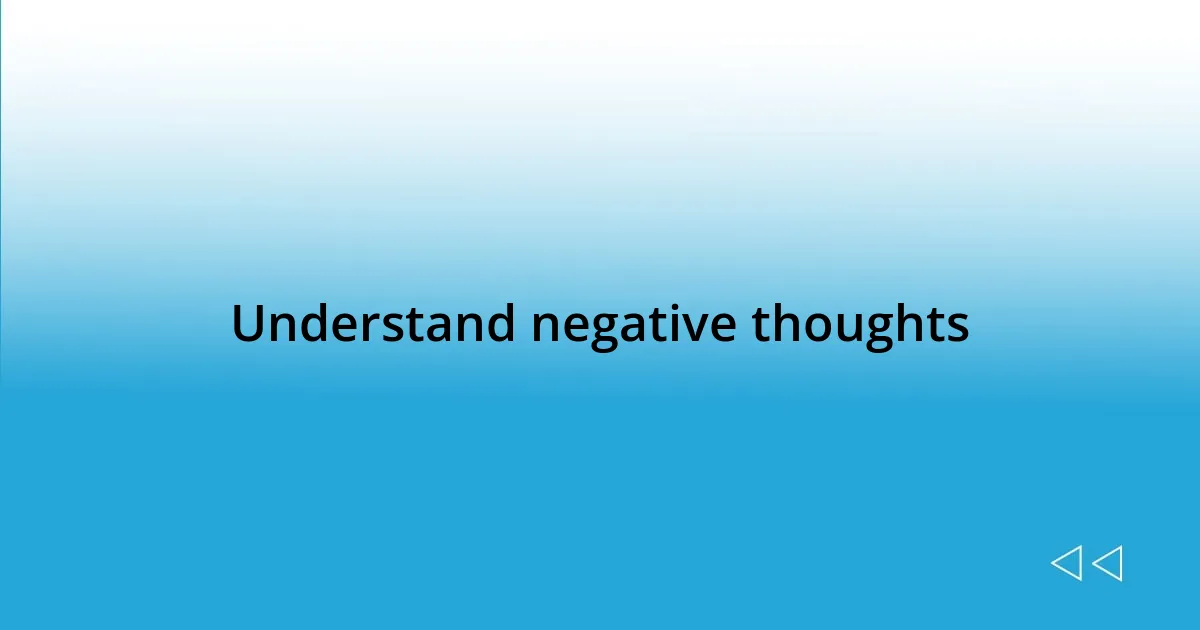
Understand negative thoughts
Negative thoughts can often feel like a relentless storm cloud hovering over our minds. I remember a time when I was constantly replaying a single failure in my head, questioning my abilities and worth. These thoughts created a cycle that seemed impossible to break—anyone else ever feel trapped like that?
Understanding that negative thoughts are just that—thoughts—is crucial. They’re not necessarily reflections of reality but rather interpretations we make based on our emotions and experiences. Have you ever caught yourself assuming the worst in a situation? I certainly have, and it’s fascinating how our minds can leap to negativity without concrete evidence.
Sometimes, I think of negative thoughts as an annoying friend who always seems to show up uninvited. Recognizing them for what they are—a mix of fears, past experiences, and external pressures—can help us detach a little. When I started to identify these thoughts rather than internalize them, a light bulb went off; suddenly, I realized I had the power to question and challenge them. Isn’t it liberating to consider that we don’t have to believe everything we think?
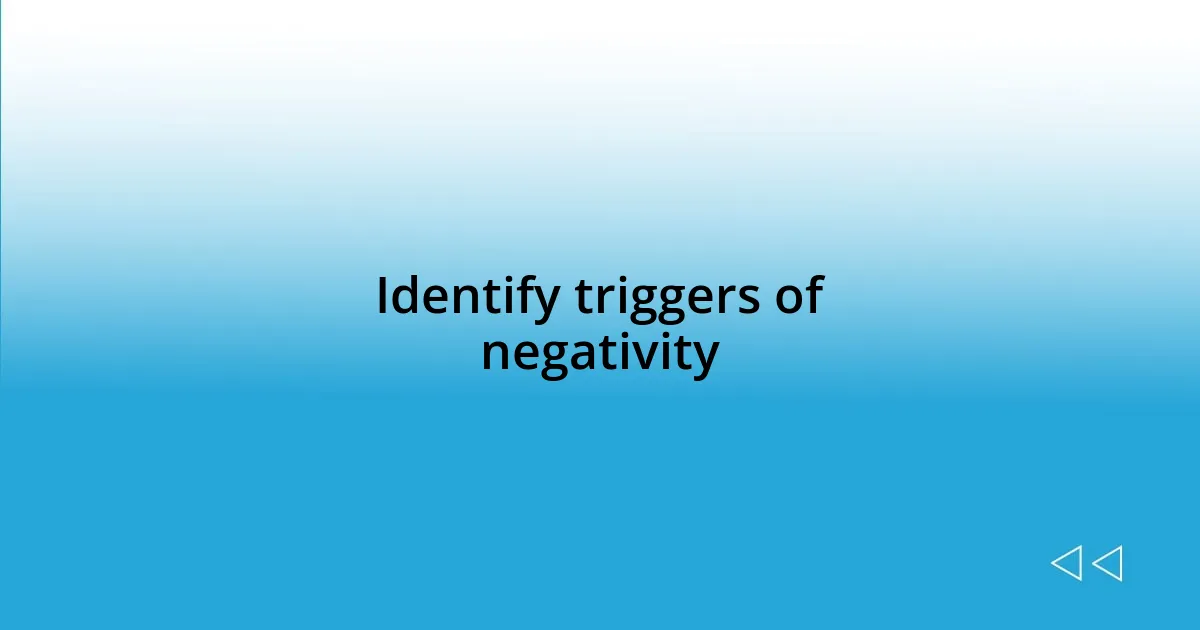
Identify triggers of negativity
Identifying triggers of negativity is a crucial step in managing our thoughts. For instance, I’ve noticed that certain environments, like busy coffee shops, can intensify my negative thoughts. It’s almost as if the noise amplifies the internal chatter, making me focus more on what’s wrong than what’s right. Have you ever experienced something similar in a crowded place?
Moreover, personal interactions can heavily influence our mindset. I recall a time when I spent the day with a friend who constantly criticized herself; as a result, my own self-doubt started creeping in. It made me realize how sharing space with negative influences can turn our thoughts sour. By pinpointing these triggers, whether they are places or people, we can take actionable steps to avoid them or limit our exposure.
Recognizing the type of content I consumed also played a significant role in my journey. I used to binge-watch shows filled with drama and conflict, which left me feeling anxious and on edge. Now, I deliberately choose uplifting media, mindful of how it shapes my perspective. By reflecting on these triggers, I become more empowered to cultivate a mindset that fosters positivity.
| Trigger Type | Example |
|---|---|
| Environment | Busy coffee shop leading to heightened anxiety |
| People | Negative self-talk from friends affecting my self-esteem |
| Media Consumption | Watching drama-filled shows increasing feelings of anxiety |
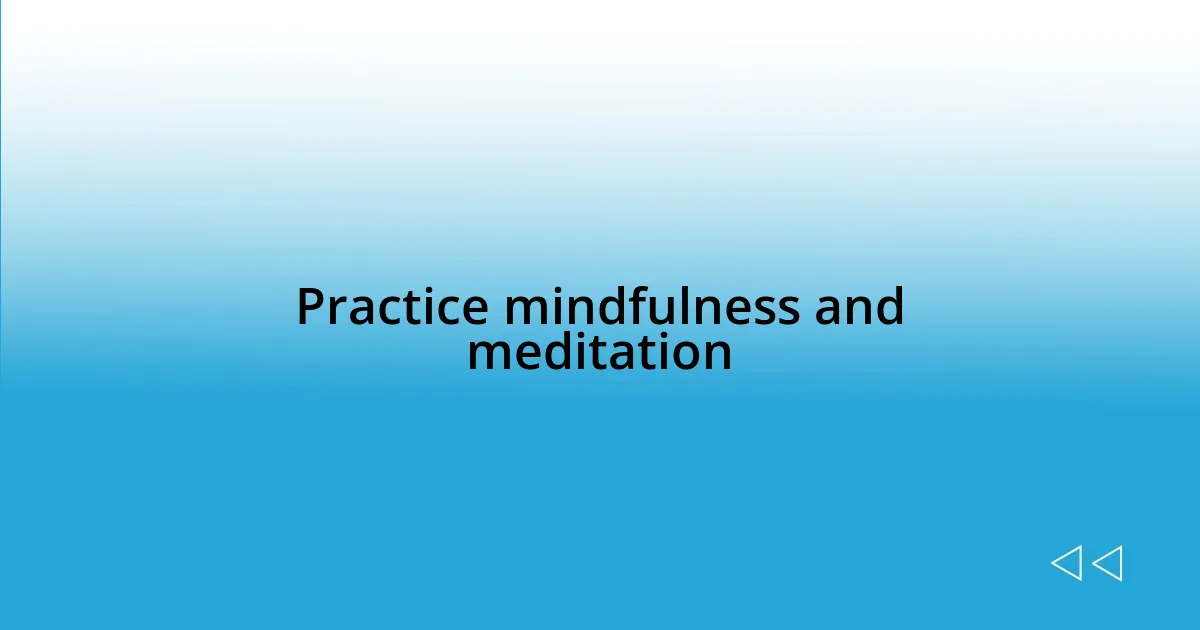
Practice mindfulness and meditation
Practicing mindfulness and meditation has been transformative for me in dealing with my negative thoughts. I remember the first time I sat in silence for a few minutes, focusing on my breath. Initially, my mind raced through worries and to-do lists, but gradually, I learned to let those thoughts float away like clouds. This practice created a space where I could observe my feelings without judgment. What a relief it is to just be present!
Here are some ways to practice mindfulness and meditation effectively:
- Breath Awareness: Focus on your breathing for a few minutes, inhaling deeply and exhaling slowly.
- Guided Meditations: Explore apps or online resources that offer guided sessions, especially for beginners.
- Mindful Walking: Take a stroll while paying attention to your surroundings; notice the colors, sounds, and sensations.
- Journaling: Spend a few moments each day writing down your thoughts and feelings without filtering them.
- Body Scan: Lay down comfortably and mentally check in with each part of your body, relieving tension as you go.
In corporate settings, I often found myself stressed during meetings. One day, I tried taking a few mindful breaths before entering the room, and to my surprise, it shifted my perspective entirely. Instead of anxiety, I felt a wave of calmness wash over me, allowing me to engage more authentically. Incorporating mindfulness into my daily routine has not only enhanced my focus but has also equipped me to tackle negativity with a clearer mind. Have you ever noticed how just a few moments of mindfulness can change your entire day?
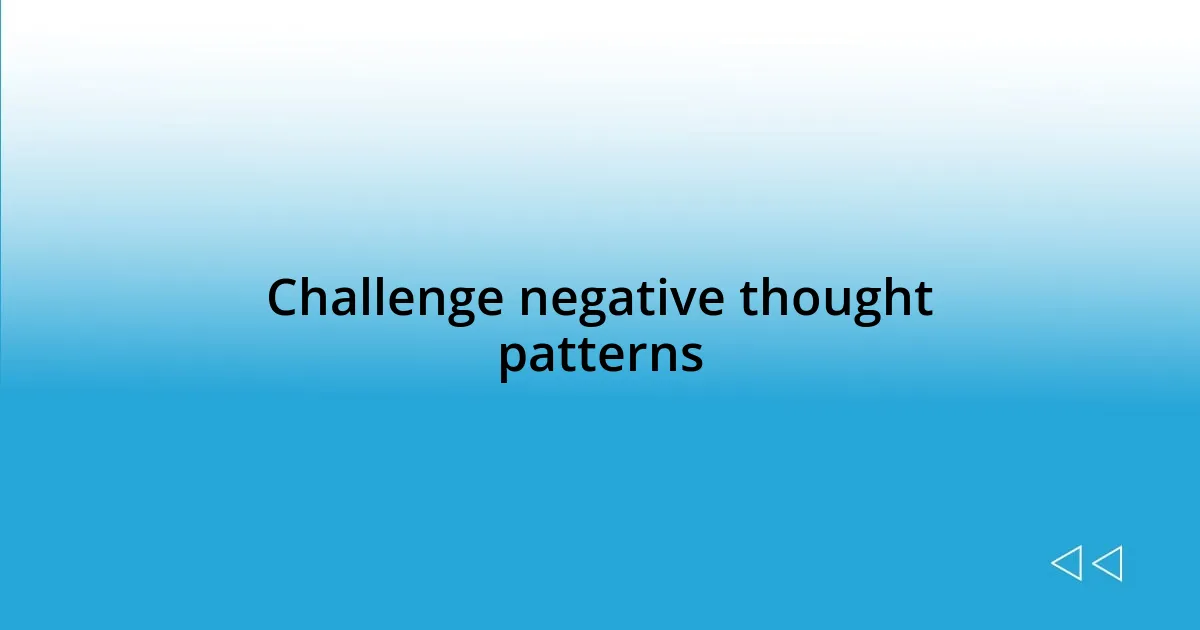
Challenge negative thought patterns
Challenging negative thought patterns can feel like climbing a steep hill, yet it’s incredibly rewarding when you reach the top. I often find myself caught in a cycle of “I can’t” or “I’m not good enough.” One technique that has really worked for me is to consciously replace those thoughts with affirmations. For instance, when doubt creeps in, I remind myself, “I am capable,” and I can feel my mood shift as those positive affirmations anchor me in reality. Have you ever noticed how a small shift in your internal dialogue can change your entire day?
I remember a time when I was preparing for a presentation at work. Panic started to set in, and negative thoughts rushed in like a tidal wave. To combat this, I made a list of past successes, reminding myself of times when I overcame challenges. Each point on the list became a stepping stone back to confidence. It’s fascinating how retracing our own achievements can pull us back from the brink of harmful thoughts. What accomplishments can you remind yourself of when negativity strikes?
Being mindful of my language in everyday conversations has also made a significant impact. I’ve started to recognize phrases I use that carry a negative connotation, such as “I have to” instead of “I get to.” This simple switch has transformed my mindset about obligations. It’s not just about avoiding negativity; it’s about fostering a more positive outlook on life. Can you think of phrases that might subtly be holding you back? Remember, changing our language can also change our narrative.
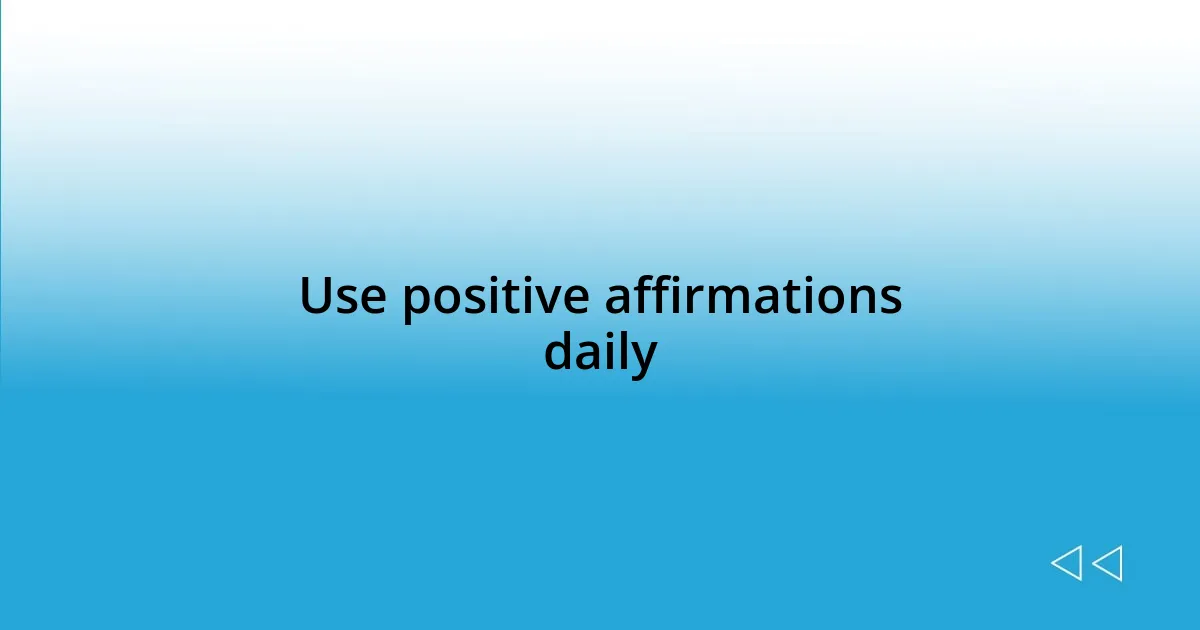
Use positive affirmations daily
Using positive affirmations daily can feel a bit awkward at first, but trust me, it’s worth the effort. I vividly recall standing in front of the mirror one morning, looking into my own eyes, and affirming, “I am enough.” It felt strange initially, but over time, those words started to resonate deep within me. Each day, I made it a ritual to repeat affirmations that nurtured my self-worth, and I could genuinely feel the energy lifting. Is there a phrase you could whisper to yourself that would spark a sense of empowerment?
When life throws challenges my way, I often pull out a set of affirmations that I’ve crafted over time. I remember a particularly tough week at work when everything seemed to go wrong. In the turmoil, I found myself saying, “I handle challenges with ease and grace.” Each time I repeated it, I felt my body relax, almost as if my mind believed it was possible. It’s incredible how a few uplifting words can change your perception of difficulties. Have you ever practiced something similar during challenging moments?
Creating a personal affirmation practice can be transformative, and I encourage you to explore your own unique approach. Sometimes, I write them on sticky notes and place them around my space. Seeing those words pop up in unexpected places has made a world of difference on days when my mood dips. It’s like a gentle reminder that I have the power to define my narrative. What simple steps can you take to surround yourself with positivity today?
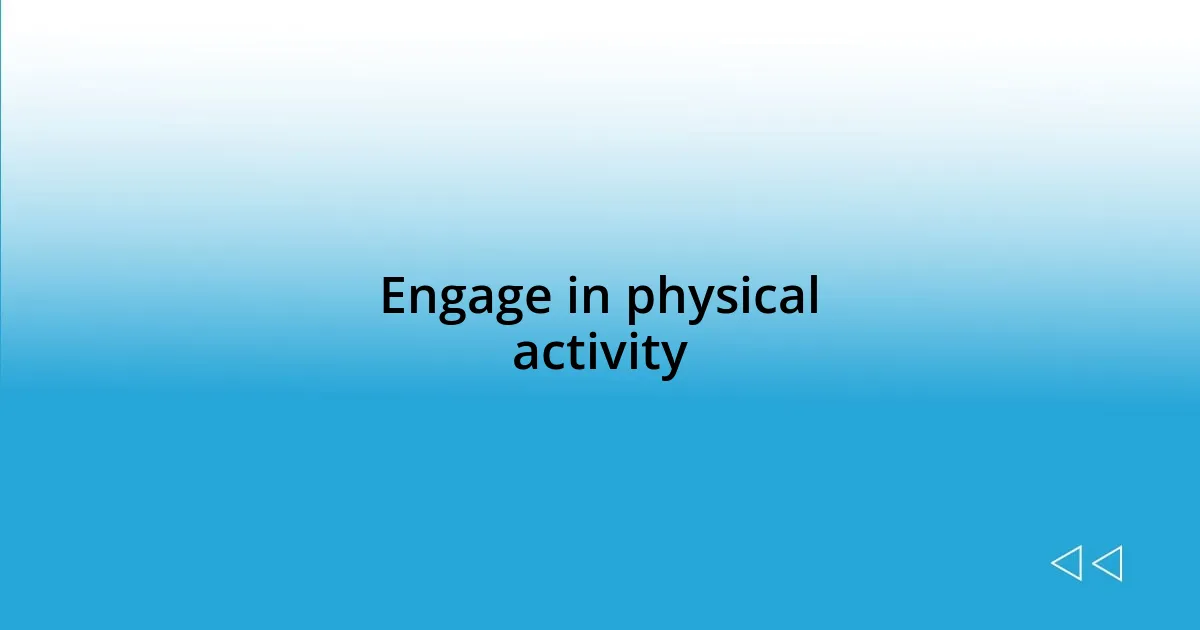
Engage in physical activity
Engaging in physical activity has been a game-changer for me in overcoming negative thoughts. I remember a particularly gloomy day when I laced up my running shoes and decided to hit the pavement. It was like stepping outside transformed my mindset; with each stride, I felt the weight of negativity lift. Have you ever noticed that fresh air and movement can shift your mood almost instantly?
Incorporating a regular workout routine not only helps keep my body in shape but also clears my mind. On days when anxiety tries to creep in, I often turn to yoga. The combination of stretching and focused breathing creates a sense of calm that counters the chatter of those pesky negative thoughts. It’s fascinating how moving my body helps me reconnect with my thoughts in a more positive way. What activities do you find help bring clarity when your mind feels cluttered?
Sometimes, I’ve found that a simple walk in nature can be just as effective. I recall a day at the park, feeling overwhelmed with life’s pressures. As I strolled past the trees, immersed in the sounds of chirping birds and rustling leaves, I was struck by how the beauty around me distracted from my worries. Isn’t it remarkable how nature can rejuvenate our spirits? Engaging in physical activity can truly be a powerful antidote to negativity—what’s your go-to way of moving your body and feeling better?
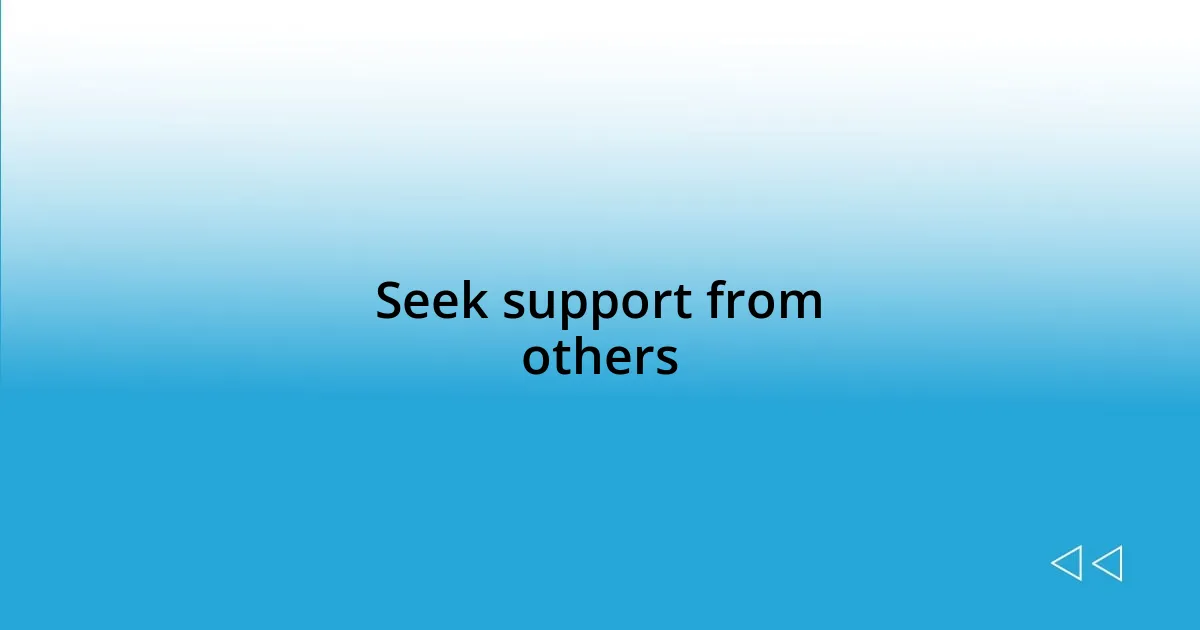
Seek support from others
Reaching out for support has been a cornerstone in my journey to combat negative thoughts. I once faced a really tough patch in life and decided to confide in a close friend. The relief that washed over me as I shared my struggles was profound; it felt like lifting a weight I’d been carrying alone. Have you ever found that simply talking about your feelings can lighten your emotional load?
When I think about the power of connection, I remember a time when a support group transformed my perspective. Being in a room with others who faced similar challenges made me realize I wasn’t alone. We exchanged stories, offered advice, and cheered each other’s victories, big or small. It’s amazing how collective strength can help us navigate our individual battles. Have you considered joining a group or finding a confidant who understands what you’re going through?
Sometimes, simply seeking the wisdom of a mentor or therapist can be the beacon of hope we all need. I recall my first session with a therapist, walking in with preconceived notions of what it might be like. To my surprise, I left feeling lighter and more equipped to tackle my thoughts head-on. Professional support can provide insights that often escape us when we’re stuck in our minds. What would it be like for you to explore this kind of support?











